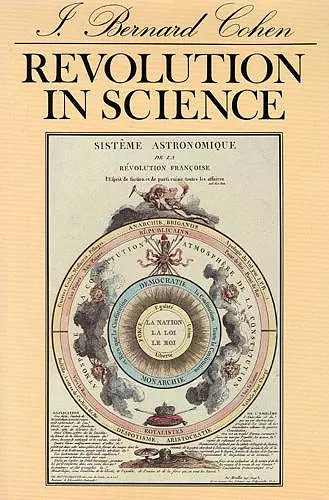Revolution in Science
Format:Paperback
Publisher:Harvard University Press
Published:14th Apr '87
Currently unavailable, and unfortunately no date known when it will be back

Professor Cohen's Revolution in Science offers an impressive survey--with his own critical insights and interpretations--of the concept of revolutions. Only someone with his prodigious erudition and knowledge of the history of science could undertake such a project. In short, Professor Cohen's book is wide-ranging in scope, packed with details of substance and interpretation, and will appeal to a similarly wide-ranging readership. It is a masterful study -- Joseph W. Dauben
Cohen’s exploration seeks to uncover nothing less than the nature of all scientific revolutions, the stages by which they occur, their time scale, specific criteria for determining whether or not there has been a revolution, and the creative factors in producing a revolutionary new idea.
Only a scholar as rich in learning as I. Bernard Cohen could do justice to a theme so subtle and yet so grand. Spanning five centuries and virtually all of scientific endeavor, Revolution in Science traces the nuances that differentiate both scientific revolutions and human perceptions of them, weaving threads of detail from physics, mathematics, behaviorism, Freud, atomic physics, and even plate tectonics and molecular biology, into the larger fabric of intellectual history.
How did “revolution,” a term from the physical sciences, meaning a turning again and implying permanence and recurrence—the cyclical succession of the seasons, the “revolutions” of the planets in their orbits—become transformed into an expression for radical change in political and socioeconomic affairs, then become appropriated once again to the sciences?
How have political revolutions—French, American, Bolshevik—and such intellectual forces as Darwinism further modified the concept, from revolution in science as a dramatic break with the past to the idea that science progresses by the slow accumulation of knowledge? And what does each transformation in each historical period tell us about the deep conceptual changes in our image of the scientist and scientific activity?
Cohen’s exploration seeks to uncover nothing less than the nature of all scientific revolutions, the stages by which they occur, their time scale, specific criteria for determining whether or not there has been a revolution, and the creative factors in producing a revolutionary new idea. His book is a probing analysis of the history of an idea and one of the most impressive surveys of the history of science ever undertaken.
Everyone, no matter how well informed, will be able to learn some new things from this book… There is nothing else like it for a panorama of what people have chosen to call revolution in science. * New York Review of Books *
[The author] has perfected a spacious study of the whole idea of revolution… Monumental scholarship… In sheer variety of riches this book has few parallels. * Nature *
[Cohen] is a scholar of extraordinary erudition… He may well know more history of science than any scholar now alive. * Science *
Professor Cohen’s Revolution in Science offers an impressive survey—with his own critical insights and interpretations—of the concept of revolutions. Only someone with his prodigious erudition and knowledge of the history of science could undertake such a project. In short, Professor Cohen’s book is wide-ranging in scope, packed with details of substance and interpretation, and will appeal to a similarly wide-ranging readership. It is a masterful study. -- Joseph W. Dauben
ISBN: 9780674767782
Dimensions: unknown
Weight: 907g
732 pages